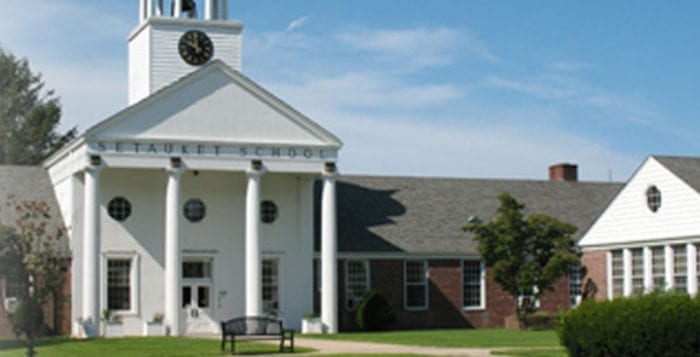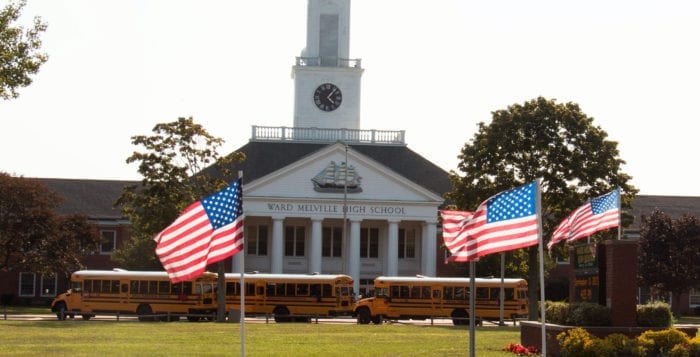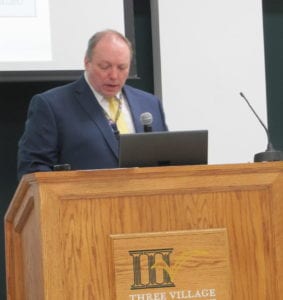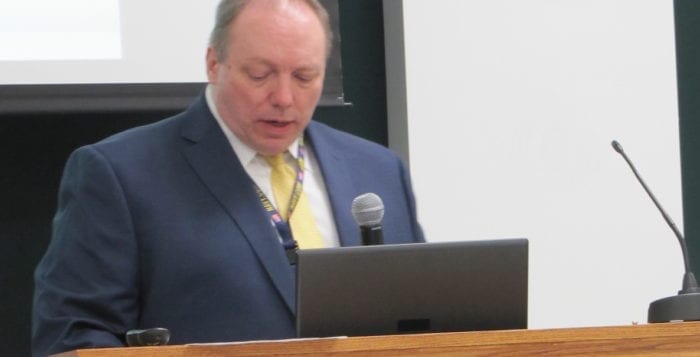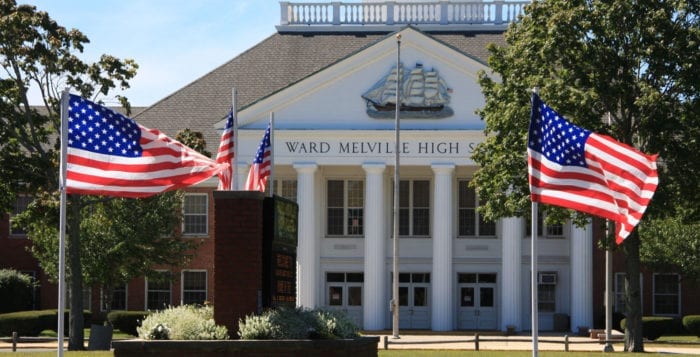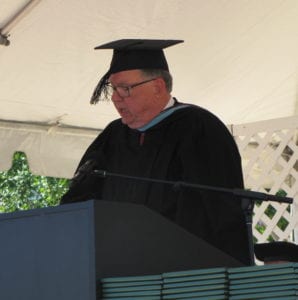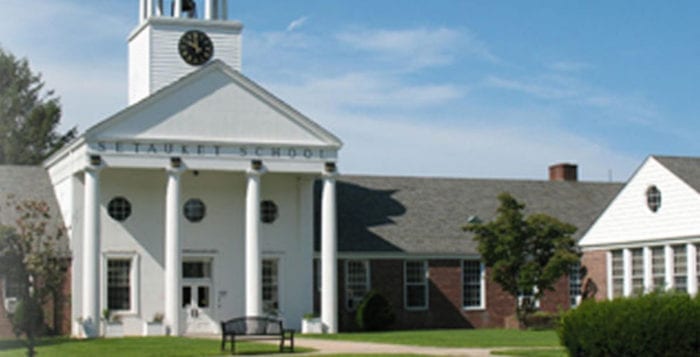Administrators say remote option will be available, students to wear masks all day
By Andrea Paldy
On Aug. 12, the Three Village Central School District held the first of three state-mandated information sessions about how it will address coronavirus-related concerns for the upcoming school year. During the live, 2 1/2 hour YouTube video stream, members of the district administration answered previously emailed questions about the fall reopening.
“We want it to not just be safe. We want people to feel safe, as well — students, their parents and our staff.”
— Jeff Carlson
Three Village, which earlier had announced its plan to fully reopen for in-person classes in September, announced during the session that it will also offer a fully remote option to families uncomfortable with sending their children back to school, or who have medical reasons for keeping their children at home.
Questions from parents last Wednesday centered on how the district would ensure student safety. Superintendent Cheryl Pedisich said that the district will follow recommendations from the American Academy of Pediatrics and the Centers for Disease Control and Prevention in taking a “more conservative” approach toward masks. Students and staff will be required to wear masks “even when physical distance can be achieved,” she said.
In addition to lunchtime and 10-minute mask breaks, students will not be required to wear masks during outdoor recess, which will be staggered to help maintain cohort groupings and social distance. Pedisich said the district would reevaluate the plan as the year goes forward.
Each building will have extra masks for students or staff who don’t have them or whose masks are lost or damaged throughout the day, officials said.
Classrooms, learning spaces and lunchrooms will be reconfigured so that students can be at least 6 feet apart, Pedisich said. Additionally, said Jeff Carlson, deputy superintendent for business services, during the discussion about facilities, clear shields will be mounted to elementary school desks, while secondary students will be given portable, collapsible shields to take to each class and to and from their homes.
Carlson also said that areas such as auditoriums, secondary cafeterias, libraries and music rooms will be equipped with high efficiency MERV-13 filters, while classrooms will have unit ventilators that will circulate fresh air into the spaces.
High touch areas such as lunch tables, school bus seats, doorknobs, stair rails and bathrooms will be cleaned throughout the day, in addition to thorough cleanings at night, he said. There will also be spray cleaners in classrooms to wipe down desks as needed, though Carlson said parents might want to send sandwich bags with disinfectant wipes to school with their secondary students.
“We want it to not just be safe,” he said. “We want people to feel safe, as well — students, their parents and our staff.”
While administrators expect the average elementary class size to decrease from 18 students once some parents opt out of the in-person plan, the district is working to reduce secondary class sizes to ensure social distancing. It is also planning to adjust schedules, with students changing classes at different times to reduce hallway congestion.
The plan, Carlson said, is to use reserves to hire more teachers to cover additional class sections as well as additional custodial staff.
The district also outlined additional measures to direct student traffic and encourage social distancing. They will include the placement of signs, tape, stickers and cones and other markers, as well as the creation of videos that deliver hygiene messages.
While all secondary students currently have Chromebooks, the district is expanding the initiative to include all elementary students. This decision will limit the amount of supplies students will need at school, since students will not be allowed to use cubbies, closet hooks or lockers for their personal items, officials said.
“We are working very hard to make sure that all students and their families feel that they are getting a substantial and quality educational opportunity.”
— Cheryl Pedisich
Gary Dabrusky, assistant superintendent for human resources, went over health protocols, saying that parents and staff will be able to use an app to record daily health screenings, which will include temperature and other symptom checks, each morning before school. He added that students or staff who begin to show symptoms during the day would be moved discreetly — to maintain privacy — to an isolated area where a nurse would be able to assess their condition.
The district will follow state Department of Health protocols when it comes to contact tracing and assist officials by keeping accurate attendance records, schedules and logs of visitors, who will be limited to vendors performing essential or emergency facilities-related tasks, Dabrusky said.
Kevin Scanlon, assistant superintendent for educational services, discussed academics and remote instruction. Whether students choose remote rather than in-person instruction, or all students end up on a remote plan, because of school closure, instruction will be “real-time teacher facilitated,” he said. It means that students will receive live instruction. Students choosing the remote option at the secondary level will follow their regular class schedule and log into live classes and interact with their teachers and classmates from home.
At the elementary level, specific teachers will be assigned to teach in-person classes, while others will be assigned to remote students, Scanlon said.
The deadline for the district’s most recent parent survey, which polls parents regarding choices of in-person return, hybrid or remote instruction, is Aug. 21. While parents have until the first day of school to change their minds, Scanlon said that it is “critical” that they get their choices in as soon as possible so that the district can staff and balance classes and get schedules to students.
Pedisich said that families who choose the fully remote option can change to in-person instruction at the beginning of the second or third trimester for elementary school, or the beginning of the second semester for secondary school. In-person students can switch to remote at any time.
“We want parents to understand that choosing a remote option for their child is not giving their child any less of an education at any level,” she said. “We are working very hard to make sure that all students and their families feel that they are getting a substantial and quality educational opportunity.”
The superintendent also emphasized that the district’s plans are “fluid” and could
still change.
“We are willing to make those adaptations to make it as safe as we possibly can,” she said.


